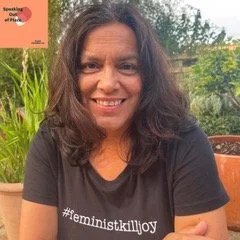In this episode of the Speaking Out of Place podcast, Professor David Palumbo-Liu and Azeezah Kanji interview renown scholar, activist, and writer Silvia Federici about her powerful and inspiring collection of essays, Re-enchanting the World: Feminism and the Politics of the Commons. These essays, written over the span of several decades, display her abilities to diagnose and indeed predict the most important issues facing us today.
Silvia Federici is a scholar, teacher, and feminist activist based in New York. She is a professor emerita and teaching fellow at Hofstra University in New York State, where she was a social science professor. She also taught at the University of Port Harcourt of Port Harcourt in Nigeria. In 1972, she co-founded the International Feminist Collective. In 1995, in the course of the campaign to demand the liberation of Mumia Abu-Jamal, she cofounded the Radical Philosophy Association (RPA) anti-death penalty project, an organization intended to help educators become a driving force towards its abolition.
For several decades, Federici has been working in a variety of projects with feminist organizations across the world like Women in Nigeria (WIN), Ni Una Menos, the Argentinian feminist organization; she alsohas been organizing a project with feminist collectives in Spain to reconstruct the history of the women who were persecuted as witches in early modern Europe, and raise consciousness about the contemporary witch-hunts that are taking place across the world.
Federici is considered one of the leading feminist theoreticians in Marxist feminist theory, women’s history, political philosophy, and the history and theory of the commons. Her most famous book, Caliban and the Witch, has been translated in more than 20 foreign languages, and adopted in courses across the U.S. and many other countries. Often described as a counterpoint to Marx’s and Foucault’s account of “primitive accumulation,” Caliban reconstructs the history of capitalism, highlighting the continuity between the capitalist subjugation of women, the slave trade, and the colonization of the Americas. It has been described as the first history of capitalism with women at the center.
SILVIA FEDERICI
When I came to America I had a shock. I never knew what it meant to be in a country that seems to have no history, being in a place where you feel like you are nowhere, you could have been dropped by a plane in a cultural, historical desert.
In the United States, they're destroying historic buildings. They've paved over cemeteries of African slaves. They're changing the environment so that memory is destroyed.
Because you are placing yourself in a broader arc of time, I asked a woman from Guatemala: how can women keep fighting for so much power? And she said, "Because, for us, the dead are not dead." This gives them the courage to go on when everything seems to be lost. I think that this is the kind of struggle that we need to make against war, against the destruction of nature.
*
Children are, in many ways, the slave of our age. Because they have so few rights, they can be violated in so many ways, and the elderly are leaving them the Earth that is poison, that is doomed. And there is a Capitalist undervaluation of children who are treated as not having any rights. Because they live with the terror every day of going to school and being shot at. And they know that this society's government is not protecting them.
*
Speaking Out of Place, which carries on the spirit of Palumbo-Liu’s book of the same title, argues against the notion that we are voiceless and powerless, and that we need politicians and pundits and experts to speak for us.
Judith Butler on Speaking Out of Place:
“In this work we see how every critical analysis of homelessness, displacement, internment, violence, and exploitation is countered by emergent and intensifying social movements that move beyond national borders to the ideal of a planetary alliance. As an activist and a scholar, Palumbo-Liu shows us what vigilance means in these times. This book takes us through the wretched landscape of our world to the ideals of social transformation, calling for a place, the planet, where collective passions can bring about a true and radical democracy.”
David Palumbo-Liu is the Louise Hewlett Nixon Professor and Professor of Comparative Literature at Stanford University. He has written widely on issues of literary criticism and theory, culture and society, race, ethnicity and indigeneity, human rights, and environmental justice. His books include The Deliverance of Others: Reading Literature in a Global Age, and Speaking Out of Place: Getting Our Political Voices Back. His writing has appeared in The Washington Post, The Guardian, The Nation, Al Jazeera, Jacobin, Truthout, and other venues.
Bluesky @palumboliu.bsky.social
Apple Podcasts · Spotify · Website















































































